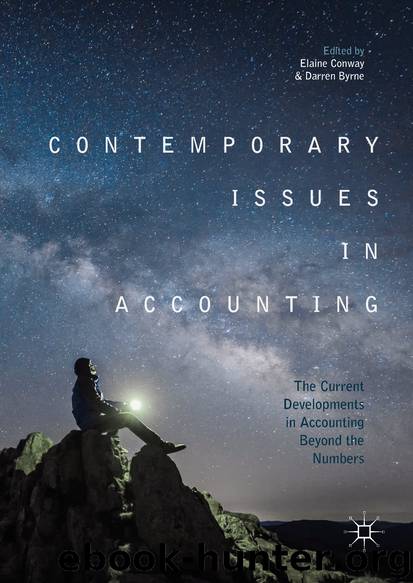Contemporary Issues in Accounting by Elaine Conway & Darren Byrne

Author:Elaine Conway & Darren Byrne
Language: eng
Format: epub
Publisher: Springer International Publishing, Cham
5.5 Conclusion
The traditional need of CTS to embrace efficient and effective tax planning still remains. The fiduciary duty of directors of maximising shareholder wealth remains a fundamental aspect (Datt 2014). It is now no longer, however, the only consideration. Now they must navigate through a much more complex corporation tax environment, particularly when they operate in more than one tax jurisdiction . Whilst globalisation has opened up a wealth of new tax planning opportunities , companies are now under immense pressure from the public and the government to deploy these opportunities in a fair manner that evidences they are paying their fair share of tax . These stakeholders now have a strong voice, requiring companies to be good corporate citizens and pay their fair of share of tax. Consumers, the media and public action groups are highly proactive in scrutinising the tax positions of companies. They are increasingly vocal if they suspect corporations have not been paying their fair share of tax, with a very powerful voice. If such stakeholders consider that the company have not paid their fair share of tax, then the company’s legitimacy , reputation, brand relations and brand equity are at great risk. However, where corporations can demonstrate that their CTS is ethical and that they are good corporate citizens, then they reduce such risks. To that end companies that have highly acceptable CSR policies are often considered to be good corporate citizens.
A crucial element of managing this tax risk is controlling the information available. This is much easier said than done. Information about companies’ tax position is much more readily available and disseminated. The media and public action groups are proactive in obtaining and publicising this information. Social media facilitates the instant, extensive and brutal dissemination of sensitive information that can be very damaging.
Another key element of CTS is the management of the tax compliance risk . The complexity of tax compliance legislation domestically and internationally makes this very challenging. It requires access to relevant, up-to-date expertise , plus the investment in appropriate accounting information systems with strong internal controls to minimise such risks. The risks surrounding tax compliance are not just restricted to timely disclosure and submission of accurate and complete information of the company’s tax position and effecting prompt payments of the correct amount of tax. It must also recognise the risk of non-compliance with a wide range of disclosure and accountability measures adopted by both domestic tax regimes and the international community . Failure to fulfil the compliance requirements, however inadvertent, exposes the company to costly sanctions and penalties.
Today’s contemporary reporting environment is much more exacting and unforgiving of companies and their CTS . To ignore the resultant tax risks would be folly indeed. Today the fiduciary duty of directors can no longer solely focus on reducing the corporation tax cost, in order to maximise shareholder wealth . Today there are other threats to shareholder equity, namely more stringent compliance regimes, greater intolerance by both tax authorities and the public of tax aggressive behaviour .
Download
This site does not store any files on its server. We only index and link to content provided by other sites. Please contact the content providers to delete copyright contents if any and email us, we'll remove relevant links or contents immediately.
Zero to IPO: Over $1 Trillion of Actionable Advice from the World's Most Successful Entrepreneurs by Frederic Kerrest(4499)
Machine Learning at Scale with H2O by Gregory Keys | David Whiting(4290)
Never by Ken Follett(3931)
Harry Potter and the Goblet Of Fire by J.K. Rowling(3842)
Ogilvy on Advertising by David Ogilvy(3598)
Shadow of Night by Deborah Harkness(3356)
The Man Who Died Twice by Richard Osman(3067)
Book of Life by Deborah Harkness(2928)
The Tipping Point by Malcolm Gladwell(2909)
Will by Will Smith(2904)
0041152001443424520 .pdf by Unknown(2843)
My Brilliant Friend by Elena Ferrante(2822)
Purple Hibiscus by Chimamanda Ngozi Adichie(2811)
How Proust Can Change Your Life by Alain De Botton(2801)
How to Pay Zero Taxes, 2018 by Jeff A. Schnepper(2643)
Hooked: A Dark, Contemporary Romance (Never After Series) by Emily McIntire(2544)
Rationality by Steven Pinker(2349)
Can't Hurt Me: Master Your Mind and Defy the Odds - Clean Edition by David Goggins(2319)
Borders by unknow(2301)
